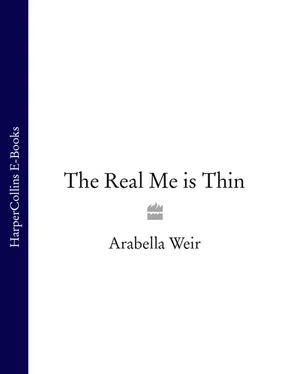A few months after the biscuit-stuffing episode, things had not improved. Although I can’t recall any more stuffing-in-secret sessions, they must have been going on because I was getting plumper and I certainly wasn’t getting away with eating anything ‘fattening’ in front of my parents.
One night, at supper, Dad decided to employ a new tack as part of the effort to wrestle my increasing size into shape. Very unusually, the whole family, Dad included, were gathered for a family meal. I’d have been about nine, just before it become evident that my parents’ marriage had begun to falter beyond repair.
Supper was mince and potatoes accompanied by some overdone cabbage – standard fare at our house in those days. For Mum, who was becoming increasingly depressed, and for whom the importance of dreaming up varied meals with which to delight her family had never been at the forefront of her mind anyway, the fact that there was anything to eat at all was good enough. I can be more generous now than I felt then about Mum’s lack of energy, because now that I’m a mother I’ve become familiar with the tedium of providing an unrelenting supply of meals for small people who invariably take them for granted. I understand now how unhappy and inadequate she felt.
Once the dishes were on the table, my father stood up, cleared his throat, and said, ‘Now, Arabella won’t be having any potatoes because she’s fat.’
What?! I thought, shocked and surprised. They wanted me to be thinner – they’d made that abundantly clear. But this was obviously a new tactic, a new means of ‘encouraging’ me to lose weight: public humiliation. It’d always been a great favourite of Dad’s: we siblings were always set against each other, being told the other was better at whatever it might be you were trying your hand at, and we were always being compared unfavourably to either each other or other people’s much more brilliant children. The idea being, I guess, that we would feel spurred to do better by the idea of being less good than the person we were being contrasted against. My parents were staggeringly competitive – with each other, certainly, but also, bewilderingly, with their children. Dad was always trying to beat us at tennis, bridge, swimming, speaking foreign languages. But then Dad was competitive with the world; it was what made him such a good golfer, tennis player, and skier. It was also the characteristic that ensured he was professionally so successful.
Humiliation had played a big part in Dad’s upbringing or rather, as it would have been referred to then, being ‘taken down a peg or two’. According to Dad’s sister, Lesley, he’d plumped out around adolescence (something he never told us), and this had brought out the worst in their mother, Nancy. Lesley told a story that exemplified this horribly. Dad was 14 when his mother, taking in the sight of his rear, exclaimed, ‘Look at you, with a great, big, fat bottom, just like a woman’s!’ Their mother was a snippy, fierce woman and as such, later, not an ideal grandmother. Nasty teasing from his mother must have contributed to Dad’s adult horror of fatness. I’m told Nancy was the life and soul of the party when she was a young woman but she’d been widowed very young, leaving her with little money and two young children, and life was hard for her thereafter which, perhaps, accounts for her unforgiving nature.
Public humiliation, or rather the fear of it, was also probably what drove Dad through an ordinary Fife high school to become head boy and then on to get a scholarship to Edinburgh University. (The Second World War meant he was delayed going to university and, as a result, he went to Oxford instead – unheard of, then, for a Scottish boy.)
Notwithstanding the evidence of my father’s success, public humiliation usually brings out the worst in people, and in my case that night, specifically, it instantly made me confused, angry, and, above all, defiant. My unvoiced reaction was, and still is when denied something on the grounds of my perceived ineligibility, ‘If you think I’m bad now, just wait: I can be so much more bad than this…’
So, the potatoes, very much thought of as ‘fattening food’ in those days, loomed threateningly on the table and Dad was compelled to stop me having any. My eldest brother, Andrew, who was by that stage carrying the chubbiness of an adolescent boy emerging into puberty, sweetly piped up, ‘Erm, I’m a bit, erm, you know, and I’ve got potatoes.’ I was touched, and I agreed with him. I couldn’t for the life of me see why there should be one rule for him and another for me.
But Dad had that query covered and quickly replied, ‘That’s different: you’re a boy.’
What’s being a boy got to with anything? I raged silently. Dad hadn’t otherwise favoured my brothers over me. He hadn’t spent more time with them than he had with me. He didn’t do ‘boys’ activities’ with them. In fact, we spent hardly any time with him; he was always at work. I couldn’t fathom his ploy; how could being a boy have anything to do with what food you were given? I later understood that it was, in fact, a central part of Dad’s beliefs and, to a great extent, Mum’s, too. Girls need to be thin and pretty, boys need to be bright – it doesn’t matter so much what they look like. Brains for boys do what looks do for women. They both took it as read that an intelligent man has every expectation of being regarded as sexy while the same is rarely true for a woman. However, the unusual element in my particular situation was that both my parents were very intelligent and accomplished – that was one of the few things they had in common. They must have known, deep down, that the message being trotted out at supper was deeply unsound and profoundly flawed; but then again, clever or not, they simply did not want and could not tolerate a fat daughter.
Predictably, Andrew’s brave intervention didn’t help, and I didn’t get any potatoes. I spent the rest of the meal seething at the injustice of it all. I hadn’t even had a moment in which to work out whether or not I wanted the potatoes; being told I couldn’t have them, though, instantly transformed them into forbidden fruit and therefore highly desirable.
Occasions such as this and the many others in which various foods were publicly declared off limits to me meant that I ended up unable to assess whether or not I actively wanted the thing. I couldn’t consider the food items on their own merit and in my own time. I couldn’t think about them neutrally. Eventually and over time I developed a sort of mania: I had to have whatever it was because I wasn’t allowed to.
This wasn’t the first or the last time my parents brought my size and, as they saw it, my need to lose weight to the family’s attention; but it sticks in my mind as emblematic of all that was wrong with me. I was wrong for being fatter than anyone else in the family. My parents believed they were helping me by pointing out to me that I ought not to waltz through life thinking it was OK to be me. They thought they were warning me of the pitfalls. As I was, I wasn’t good enough. I must learn denial in order to reach a better me and one more pleasing to my parents. The only trouble was that that’s quite a tall, if not unreachable, order for a child.
It’s hard enough trying to diet as an adult, so tenuous is one’s grip in any given moment on how badly one wants to be thin over how badly one wants to eat. And, at the tender age of nine, I wasn’t yet up to the levels of self-loathing I’d go on to achieve later in life – the requisite, self-perpetuating levels of self-hatred required to not eat all the time.
This supper was also the first time I remember thinking that life overall wasn’t fair. How could it be that I got fatter and my siblings didn’t? How was it that they had got automatic membership to the Thin Person’s Club, the club that was evidently going to exclude me for life, while I’d got automatic membership to the Whatever You Eat Will Make You Fat Club?
Читать дальше












